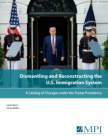COVID-19 Analysis and Data
COVID-19 Analysis and Data
Recent Activity
Recent Activity
Expert Q&A, Audio
December 9, 2021
How has the business world responded to disruptions from the COVID-19 pandemic? In this episode of Moving Beyond Pandemic, we speak with two former government officials who are now in the private sector—Ian Robinson of the immigration law firm Fragomen and Brendan Ryan, CEO of Nomadic, about the trends and policy environment shaping business mobility decisions.


















Can Omicron Finally Get the World to Cooperate on Pandemic Mobility Management?